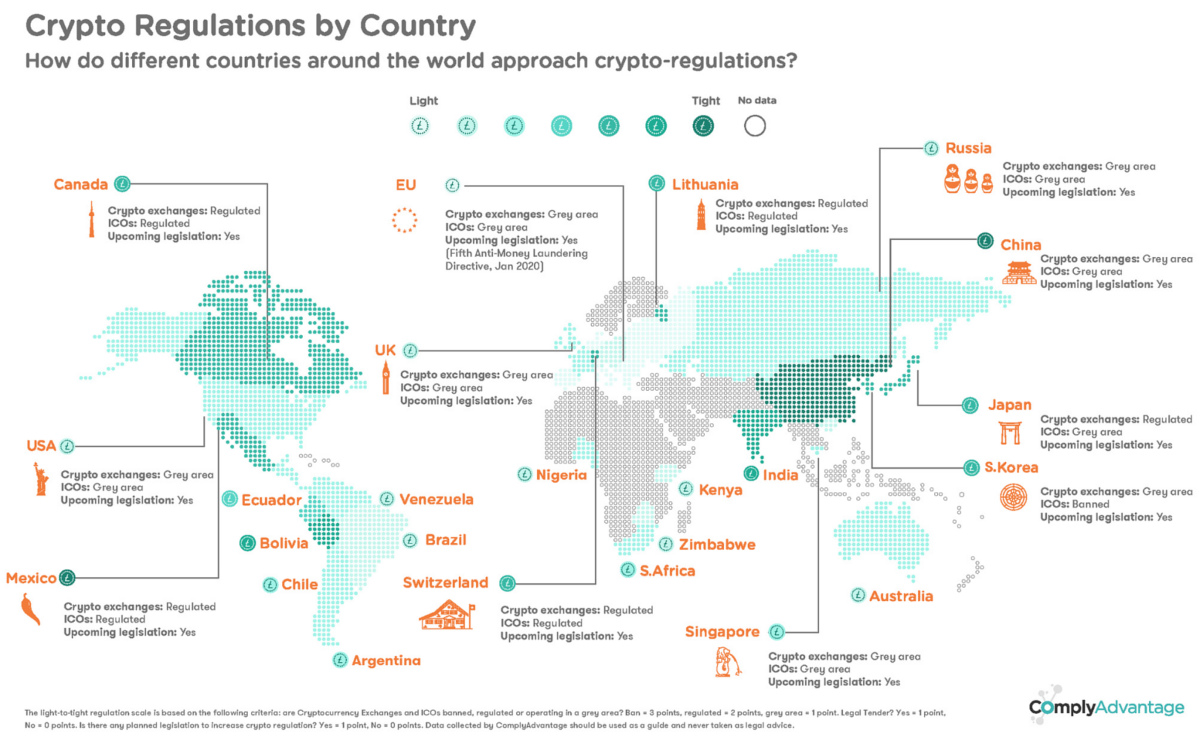Cryptocurrency Regulation: Overview of legislation in different countries

- Introduction to Cryptocurrency Regulation
- Legislation in the United States
- Regulatory Framework in the European Union
- Cryptocurrency Laws in Asia
- Challenges of Regulating Cryptocurrency
- Future Trends in Cryptocurrency Regulation
Introduction to Cryptocurrency Regulation
Cryptocurrency regulation is a complex and evolving landscape that varies significantly from country to country. Governments around the world are grappling with how to regulate this new form of digital currency, with some embracing it as a legitimate form of payment, while others are more skeptical.
In the United States, for example, the Securities and Exchange Commission (SEC) has taken a cautious approach to regulating cryptocurrencies, viewing them as securities subject to existing laws. On the other hand, countries like Japan have taken a more proactive stance, passing legislation that recognizes cryptocurrencies as legal tender and establishing a regulatory framework to oversee their use.
In Europe, the approach to cryptocurrency regulation varies from country to country. Some countries, like Switzerland, have adopted a more permissive approach, welcoming cryptocurrency companies with open arms. Others, like Germany, have taken a more cautious approach, imposing strict regulations on cryptocurrency exchanges and requiring them to obtain a license to operate.
Overall, the regulatory environment for cryptocurrencies is still in its early stages, with many countries still trying to figure out the best way to approach this new form of digital currency. As the technology continues to evolve and become more mainstream, it is likely that we will see more countries develop comprehensive regulatory frameworks to govern the use of cryptocurrencies.
Legislation in the United States
In the United States, the regulation of cryptocurrency is a complex and evolving landscape. Various government agencies have taken different approaches to overseeing the use of digital currencies. The Securities and Exchange Commission (SEC) has been actively involved in regulating initial coin offerings (ICOs) and classifying certain cryptocurrencies as securities. The Commodity Futures Trading Commission (CFTC) has also asserted its authority over cryptocurrency derivatives.
Additionally, individual states have started to pass their own legislation regarding cryptocurrencies. For example, New York has implemented the BitLicense framework, which requires companies dealing with virtual currencies to obtain a license to operate in the state. Other states, such as Wyoming, have taken a more crypto-friendly approach by passing laws that recognize and protect digital assets.
On the federal level, there have been discussions about the need for a comprehensive regulatory framework for cryptocurrencies. Some lawmakers have proposed bills that aim to provide clarity on issues such as taxation, consumer protection, and anti-money laundering measures. However, as of now, there is no overarching legislation that governs the use of cryptocurrencies in the United States.
Overall, the regulatory environment for cryptocurrencies in the United States is still in a state of flux. It is essential for businesses and individuals involved in the crypto space to stay informed about the latest developments and comply with existing regulations to avoid potential legal issues.
Regulatory Framework in the European Union
The regulatory framework in the European Union regarding cryptocurrency is a complex and evolving landscape. The EU has taken a cautious approach to regulating cryptocurrencies, aiming to strike a balance between fostering innovation and protecting consumers.
One of the key pieces of legislation in the EU related to cryptocurrencies is the Fifth Anti-Money Laundering Directive (5AMLD). This directive, which came into effect in January 2020, requires cryptocurrency exchanges and wallet providers to conduct customer due diligence to prevent money laundering and terrorist financing.
In addition to the 5AMLD, the EU has also been working on a comprehensive regulatory framework for cryptocurrencies through the Markets in Crypto-Assets Regulation (MiCA). MiCA aims to provide legal certainty for issuers and service providers in the cryptocurrency space, while also ensuring investor protection and market integrity.
Overall, the EU’s approach to cryptocurrency regulation is focused on promoting innovation while mitigating risks. By implementing measures such as the 5AMLD and working towards the adoption of MiCA, the EU is striving to create a regulatory environment that supports the growth of the cryptocurrency industry while safeguarding the interests of consumers and investors.
Cryptocurrency Laws in Asia
In Asia, the regulation of cryptocurrencies varies significantly from country to country. Some nations have embraced digital currencies, while others have taken a more cautious approach. Here is an overview of the cryptocurrency laws in different Asian countries:
1. **Japan**: Japan has been at the forefront of cryptocurrency regulation, being one of the first countries to recognize Bitcoin as a legal form of payment. The country has a licensing system in place for cryptocurrency exchanges to ensure consumer protection and prevent money laundering.
2. **South Korea**: South Korea has also been proactive in regulating cryptocurrencies, implementing strict anti-money laundering measures and requiring exchanges to adhere to Know Your Customer (KYC) guidelines. However, the country has faced some challenges, such as banning initial coin offerings (ICOs) in 2017.
3. **China**: China has taken a more restrictive stance on cryptocurrencies, banning ICOs and shutting down cryptocurrency exchanges in 2017. The country has expressed concerns about the potential risks associated with digital currencies, such as fraud and financial instability.
4. **Singapore**: Singapore has adopted a more progressive approach to cryptocurrency regulation, aiming to create a conducive environment for innovation while ensuring consumer protection. The country has implemented a licensing framework for cryptocurrency exchanges and has been actively exploring the use of blockchain technology in various industries.
5. **India**: India has had a tumultuous relationship with cryptocurrencies, with the government proposing a ban on digital currencies in 2018. However, the Supreme Court of India overturned the ban in 2020, allowing for the resumption of cryptocurrency trading in the country.
Overall, the regulatory landscape for cryptocurrencies in Asia is diverse, with some countries embracing digital currencies as a form of payment, while others remain cautious about the potential risks. It is essential for investors and businesses operating in the region to stay informed about the latest developments in cryptocurrency regulation to ensure compliance with the law.
Challenges of Regulating Cryptocurrency
Regulating cryptocurrency poses several challenges for governments around the world. One of the main issues is the decentralized nature of cryptocurrencies, which makes it difficult for traditional regulatory bodies to monitor and control. This lack of central authority means that it can be challenging to enforce regulations and prevent illegal activities such as money laundering and tax evasion.
Another challenge is the rapid pace of innovation in the cryptocurrency space. New cryptocurrencies and technologies are constantly being developed, making it hard for regulators to keep up with the changing landscape. This can lead to outdated regulations that are ineffective in addressing new threats and risks.
Additionally, the global nature of cryptocurrencies presents a challenge for regulators. With transactions happening across borders, it can be challenging to coordinate regulatory efforts between different countries. This lack of international cooperation can create loopholes that allow bad actors to exploit differences in regulations.
Overall, regulating cryptocurrency requires a delicate balance between fostering innovation and protecting consumers and investors. Governments must find ways to adapt to the unique challenges posed by cryptocurrencies while ensuring that they are not used for illegal activities.
Future Trends in Cryptocurrency Regulation
The future trends in cryptocurrency regulation are constantly evolving as governments around the world grapple with how to best oversee this rapidly growing industry. While some countries have taken a more hands-off approach, others have implemented strict regulations to protect consumers and prevent illicit activities.
One trend that is likely to continue is the push for more transparency in cryptocurrency transactions. Regulators are increasingly concerned about the use of digital currencies for money laundering and other illegal activities. As a result, we can expect to see more stringent reporting requirements for cryptocurrency exchanges and wallet providers.
Another trend to watch is the rise of central bank digital currencies (CBDCs). Several countries are exploring the possibility of issuing their own digital currencies, which would be regulated by the central bank. This could have a significant impact on the cryptocurrency market, as CBDCs could potentially compete with existing cryptocurrencies.
Additionally, we may see more collaboration between regulators from different countries to create a more cohesive regulatory framework for cryptocurrencies. As digital currencies are borderless by nature, it is becoming increasingly important for regulators to work together to address common challenges and ensure a level playing field for market participants.
Overall, the future of cryptocurrency regulation is likely to be shaped by a combination of technological advancements, regulatory developments, and international cooperation. It will be important for stakeholders in the cryptocurrency industry to stay informed about these trends and adapt to the changing regulatory landscape.



